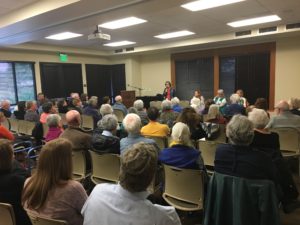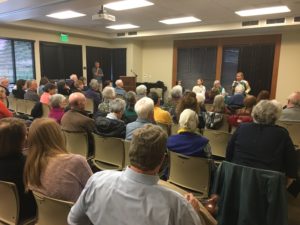
A team from the OPCW was due to arrive in Syria to investigate the alleged chemical weapons attacks in Douma on Saturday, April 14th. However, that is the morning on which Washington, in coordination with France and the UK, decided to launch around 100 missiles into Syria. Russia analyst and former British military officer, Paul Robinson had a good summary and analysis of the strikes at his blog :
What stands out for me is the choice of weapons in this attack: long-range missiles. The Brits, for instance, fired their missiles from close to their airbase on Cyprus. They didn’t come close to Syria. It seems that they were afraid of Syrian and Russian air defences, and they weren’t prepared to go to the effort of suppressing them, which would have required a long and costly campaign and would have run the danger of getting them into a war with the Russians. The Russian Ministry of Defence says that its own air defences didn’t get involved but that those of the Syrian army shot down 71 of the 103 missiles fired. The Syrian Observatory for Human Rights (not normally noted for promoting pro-Assad propaganda) claims that 65 were shot down. The Americans are currently denying this. The truth is hard to determine. It may be that the Western allies are right to be fearful of the Syrian/Russian air defence system. Or maybe not. What is clear, though, is that they don’t seem to be willing to take the chance. They also don’t want to get too deeply involved. So, they have limited themselves to firing a few missiles in an utterly pointless manner, while making some wild claims that this would ‘set back Syrian chemical weapons programme for years.’
This is playing at war. Unfortunately, it is symptomatic of how the Americans and the Brits wage war nowadays. They can’t resist getting involved, but the outcome doesn’t matter to them enough for them to commit the resources, and make the sacrifices, required for a successful outcome. So, in Afghanistan they committed themselves enough to stir up the locals, to flood the country with money which boosted corruption and filled the coffers of the Taliban, and generally to make everything worse, but not enough to win (which would have required a simply enormous amount of resources). In Libya, they did just enough to push the country into chaos, but not enough to put it back together again. In Syria, they’ve pumped in enough weapons and money to thoroughly mess the place up (and in the process supply a whole bunch of people who really aren’t their friends), but not enough to overthrow Assad. And so on.
Now, to be fair, it’s a sign of some intelligence that they haven’t gone any further than they have. It would have been completely disproportionate to have done so. We must welcome the fact that in attacking Syria, they limited themselves to a symbolic gesture and stayed well clear of Russian targets. As I said in my last post, achieving the objective of regime change would require enormous destruction. It’s a good thing that our leaders aren’t prepared to go that far. The problem is, though, is that if they want to succeed that’s how far they have to go. If they’re not prepared to do so, they shouldn’t get involved at all in the first place. Unfortunately, they just can’t stop themselves. Consequently, they end up playing at war, failing time after time, while causing a lot of death and destruction in the process.
Robinson makes an excellent point. These actions seem to just be an excuse to waste huge amounts of money on arms and to destroy countries whose leaders don’t comply with our wishes or are in the way of our geopolitical and economic desires. There is certainly no will to stabilize or install a functioning government because, as Robinson points out, it would require too much investment in terms of human resources, which would also risk major casualties.
However, the bad will and distrust that builds as a result of these repeated actions and the propaganda that leads up to them has created a dangerous atmosphere between nuclear superpowers whose military personnel are in close proximity. What if there is a slip-up in the “choreography” of these launches supposedly designed to avoid hitting any Russian targets? What if Russians dial up the hotline to find out what’s going on and are put on hold for nearly a half hour as the Russian military claimed happened in 2016 when the Syrian army was hit in Deir Ezzor? Why do we want to take it that far? And why does our leadership keep saying and doing reckless things that the Russians have to allegedly provide a face-saving out for?
As for Russia’s response to this illegal attack on its ally without even waiting for the results of an investigation that might actually substantiate the allegations against the Syrian government, Russia analyst Gilbert Doctorow wrote the following:
For the Russians there could only be outrage. They were on the receiving end of what was a publicly administered slap in the face to President Vladimir Putin, who was named and supposedly shamed in Trump’s speech for providing support to the “animal” Assad. Putin had been calling upon the U.S. and its allies to show restraint and wait for the conclusion of the OPCW investigation in Duma.
Russia’s ambassador to Washington, Anatoly Antonov, repeated after the attacks Moscow’s prior warning that there would be “grave consequences” for the U.S. and its allies. These were not spelled out. But given Putin’s record of caution, it would be surprising if Moscow did anything to exacerbate the situation.
That caution left the U.S. exposed as an aggressor and violator of international law. Since we are in a New Cold War, habits from the first Cold War are resurfacing. But the roles are reversed today. Whereas in the past, it was Washington that complained to high heaven about the Soviet military intervention in Hungary and Czechoslovakia, today it is Russia that will go on the offensive to sound off about US aggression.
But is that all we may expect? I think not. Putin has a well-earned reputation as a master strategist who takes his time with every move. He also knows the old saying that revenge is a dish best served cold. He has frequently advocated “asymmetric” responses to Western moves against Russian interests. The question of counter moves had already been on his mind since the U.S. Treasury introduced new and potentially harsh economic sanctions on Russia with effect from April 6.
In fact, Russian legislators were busy preparing to introduce in the Duma on Monday a bill empowering the Russian president to issue counter-sanctions. These include an embargo on the sale of critical components to the U.S. aircraft industry which is 40 percent dependent on Russian-sourced titanium for production of both military and civilian planes. There is also the proposed cancellation of bilateral cooperation in space where the Russians supply rocket engines used for U.S. commercial and other satellite launches, as well as a total embargo on sales of U.S. wines, spirits and tobacco in the Russian Federation.
Aside from the withdrawal of titanium sales, these and other enumerated measures pale in significance to the damage done by the U.S. sanctions on the Rusal corporation, the world’s second largest producer and marketer of aluminum, which lost $12 billion in share value on the first day of sanctions. But that is to be expected, given that the United States is the world’s largest economy, measuring more than 10 times Russia’s. Accordingly its ability to cause economic damage to Russia far exceeds the ability of Russia to inflict damage in return.
The only logical outcome of further escalations of U.S. economic measures would be for Russia to respond in the one area where it has something approaching full equality with the United States: its force of arms. That is to say, at a certain point in time purely economic warfare could well become kinetic. This is a danger the U.S. political leadership should not underestimate.
Considering the just inflicted U.S. insult to Russia by its attack in Syria, Moscow may well choose to respond by hitting U.S. interests in a very different location, where it enjoys logistical superiority and also where the counter-strike may be less likely to escalate to direct crossing of swords and the unthinkable—possible nuclear war.
A number of places come to mind, starting in Ukraine where, in an extreme reaction, Russia has the option of removing the regime in Kiev within a 3-day campaign, putting in place a caretaker government until new elections were held. That would likely lead to armed resistance, however, and a Russian occupation, which Moscow neither wants nor can afford.
Speaking of the restraint showed by Putin, I keep making the point that many pundits and politicians keep accusing Putin of being aggressive, yet they are constantly banking on Putin’s restraint in the face of a never-ending series of provocations. Is there not some irony here?
Our corporate mainstream media did its usual despicable job of largely egging on the militarism. Fairness and Accuracy in Reporting (FAIR) provides the gory details here and here. Doctorow, in another article, followed the European media on the Syria attack and reported more variety of coverage and viewpoint, especially in Germany (which declined to participate in the attack) and Euronews:
The Die Welt online edition today discusses how the United States and Europe used the mission to test the battleground effectiveness of some of their latest weaponry.
Frankfurter Allgemeine has two feature articles, neither of which follow the American media agenda and might be said to show some independence of thought. One article presents and defends the notion that the weekend attacks showed the Pentagon is “the last bastion of Sense” in the Trump administration. What they think of the President is self evident. Meanwhile the other article tells us that despite the attacks Syrian President Bashar Assad will not give in and is holding to his chosen course, while the Russians are said to be counting on opening a strategic dialogue with the USA over arms control.
….To be sure, the most remarkable departure from the US media track that I note in Europe yesterday and today is on the television, specifically on Euronews. The company’s motto is “Euronews. All Views.” Nice sounding and usually irrelevant, but not this weekend. To be sure, the US, UK, French government accounts of what they achieved are given full coverage in each hourly news bulletin. But at the same time, the Russians are given what appears to be equal time to set out their totally diametrically opposed positions: on whether any chemical attacks at all occurred in Douma, Eastern Goutha, on the violation of international law and of the UN Charter that the Allied attack on Syria represented, on its being “aggression,” on its link to the Skripal case.
In fact, on Saturday Euronews exceptionally gave nearly complete live coverage to Russian Foreign Minister Sergey Lavrov as he spoke in Moscow to the 26th Assembly of the Council of Foreign and Defense Policy. During this talk, Lavrov divulged the findings of the Swiss laboratory which had examined samples of the chemicals gathered in Salisbury in relation to the Skripal poisonings, findings which he said pointed not to Novichok, as was reported by Boris Johnson, but to a nerve agent developed by the United States and produced also in Britain. Lavrov likened the faked attack in Salisbury to the faked chemical attack in Douma.
Letting the Russians deliver extensively their views on what happened in Syria without commentary by their own journalists might be considered extraordinary by Euronews or any other European broadcaster’s standards, for which the public can only be grateful.
My mentor, Sharon Tennison, was in Washington DC in the lead-up to the strike on Syria. Here is the atmosphere she reported:
Mood in Washington, April 8 – 13: The immediate possibility of war between Syria and Russia was on TV screens in hotel lobbies and congressional waiting rooms and tensions were felt behind closed doors in nearly every meeting. It felt like our capital was completely “locked down.” No one wanted to mention their positions on current issues. I’d never before experienced our capital like this.
Simultaneously, young families visiting Washington were innocently enjoying historic monuments, etc. In impromptu inquiries, I asked if they were paying attention to politics and got nonchalant answers back. Apparently they were unaware of the current situation. How could they not be aware? Maybe they view TV news as hyped up fictional TV programs? What a disconnect!





